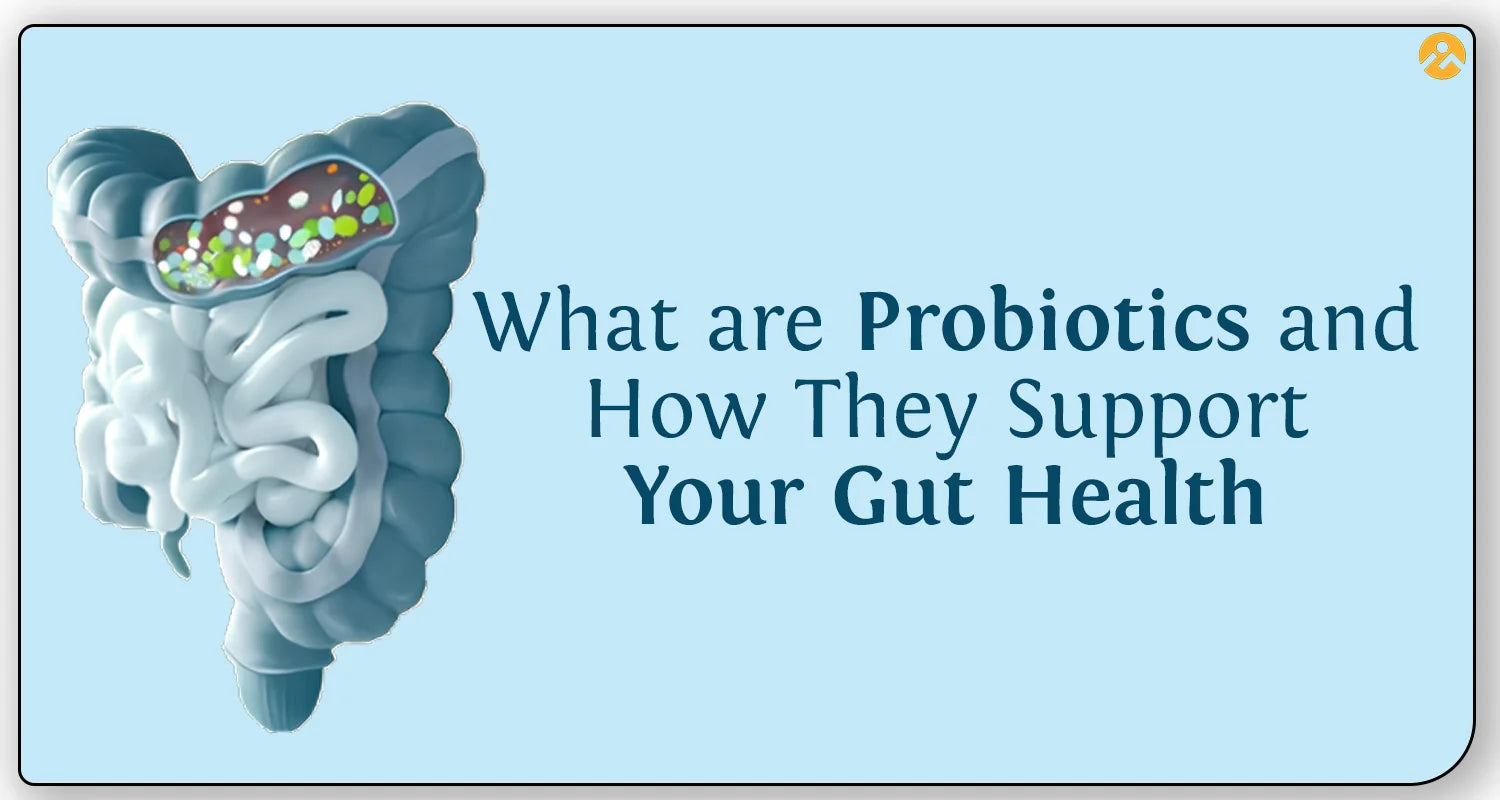What are Probiotics and How They Support Your Gut Health
•Posted on February 14 2025

The human body houses trillions of bacteria, both good and bad. Amongst them are probiotics, they stand out as beneficial microorganisms that play a crucial role in digestive health, immunity, and overall well-being. Over the years, research suggests the importance of maintaining a balanced gut microbiome, and probiotics have emerged as key players in this process. But what exactly are probiotics, and how can they affect your health?
In this comprehensive guide, we have laid detailed information about what are probiotic, how they can be beneficial for your gut health, and the role of probiotics supplements in your daily nutrition.
What Are Probiotics?
Probiotics often, found in fermented foods and supplements, are live microorganisms, primarily beneficial bacteria and yeast, that help maintain a healthy balance in the gut microbiome. The most common probiotic strains belong to the Lactobacillus and Bifidobacterium families, with Saccharomyces boulardii being a well-known probiotic yeast.
These beneficial microbes aid in breaking down food, absorbing nutrients, and preventing the overgrowth of harmful bacteria. Research has shown that a well-balanced gut microbiota is directly linked to improved digestion, immune function, and even mental well-being.
_______________________________________________________________________________
DID YOU KNOW?
The gut microbiome contains over 100 trillion bacteria, outnumbering human cells in the body.
_____________________________________________________________________________
When Are Probiotics Recommended and Who Should Take Them?
Probiotics can be beneficial for various groups of people, particularly those experiencing digestive or immune-related concerns. They are recommended in the following scenarios:
- After Antibiotic Use: Antibiotics can kill both harmful and beneficial bacteria. Taking probiotics helps restore gut balance.
- Digestive Disorders: Individuals with conditions like irritable bowel syndrome (IBS) or inflammatory bowel disease (IBD) may benefit from probiotics.
- Frequent Digestive Discomfort: Those experiencing bloating, constipation, or diarrhea can see improvements with probiotic use.
- Weakened Immune System: A healthy gut is closely linked to immune function, making probiotics useful for those prone to frequent infections.
- Poor Diet and Lifestyle Habits: Processed foods and high sugar intake can disrupt gut flora, and probiotics help restore balance.
- Mental Health Support: Emerging research suggests that gut health influences mood and cognitive function, making probiotics relevant for mental well-being.
How Do Probiotics Benefit Gut Health?
The gut microbiome is a complex ecosystem that plays a significant role in digestion, immunity, and even brain function. Here’s how probiotics contribute to gut health:
- Restoring Microbial Balance Probiotics help maintain a balanced ratio of beneficial and harmful bacteria, which is essential for overall gut function.
- Supporting Digestion and Nutrient Absorption Certain probiotic strains aid in breaking down food components, making nutrients like vitamins and minerals more bioavailable.
- Enhancing Gut Barrier Function A strong gut lining prevents harmful substances from entering the bloodstream. Probiotics help strengthen this barrier.
- Reducing Digestive Discomfort Studies suggest probiotics can alleviate bloating, constipation, and diarrhea by regulating gut motility.
- Influencing Mental Health The gut-brain axis is a communication network linking the gut and the brain. Probiotics can positively impact mood and cognitive function.
_____________________________________________________________________________
DID YOU KNOW?
Nearly 70% of the immune system is housed in the gut, making probiotics crucial for immunity.
_____________________________________________________________________________
How to Get Probiotics from Food?
Probiotics are naturally present in several fermented foods. Incorporating these into your diet can help maintain a balanced gut microbiome.
- Yogurt – Rich in Lactobacillus and Bifidobacterium strains.
- Kefir – A fermented milk drink containing multiple probiotic strains.
- Sauerkraut – Fermented cabbage that supports gut health.
- Kimchi – A spicy Korean dish made from fermented vegetables.
- Miso – A fermented soybean paste commonly used in soups.
- Tempeh – A probiotic-rich soy product high in protein.
- Pickles – Naturally fermented pickles provide beneficial bacteria.
- Kombucha – A fermented tea containing probiotics and organic acids.
Probiotic Supplements: Are They Necessary?
While probiotic-rich foods offer natural sources of beneficial bacteria, probiotic supplements provide a more concentrated and consistent dose.
iMeMyself’s Pre and Probiotic Supplement is designed to support gut health by combining probiotics with prebiotics, which serve as food for beneficial bacteria. This synergistic formula helps maintain digestive balance, supports immune function, and enhances nutrient absorption. For individuals with dietary restrictions or inconsistent probiotic intake from food, supplements offer a convenient solution.
Conclusion
Probiotics play a vital role in maintaining gut health, supporting digestion, and enhancing immune function. Whether obtained through food sources or supplements, ensuring a consistent intake of probiotics can contribute to overall well-being. If you're looking for a structured way to incorporate probiotics into your routine, consider iMeMyself’s Pre and Probiotic Supplement, designed for optimal gut health support.
FAQs
- Can I take probiotics daily?
Yes, probiotics are safe for daily use and help maintain gut balance when taken consistently.
- How long does it take for probiotics to work?
It varies, but noticeable benefits can appear within a few days to a few weeks, depending on the individual and the strain used.
- Do probiotics help with bloating?
Yes, certain strains of probiotics can help reduce bloating and improve digestion.
- Are there any side effects of taking probiotics?
Some people may experience mild gas or bloating initially, but these symptoms usually subside as the body adjusts.
- Can I get enough probiotics from food alone?
While probiotic-rich foods provide beneficial bacteria, supplementation ensures a consistent and adequate intake, especially for those with dietary restrictions.
 Best Sellers
Best Sellers
 Energy
Energy
 Digestion
Digestion
 Vitamins and Minerals
Vitamins and Minerals
 Personalised Nutrition
Personalised Nutrition
 Talk to expert
Talk to expert